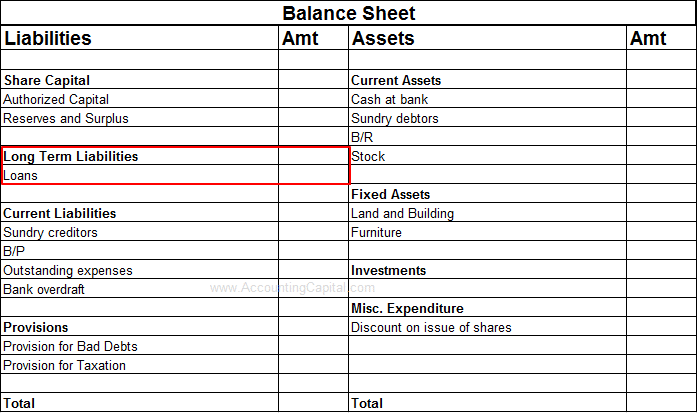Journal Entry for Loan Taken From a Bank
Banks and NBFCs are an integral part of an economy as they act as a support for companies by providing them additional cash leverage in the form of loans. Such a loan is shown as a liability in the books of the company. Following is the journal entry for loan taken from a bank;
| Bank Account | Debit | Debit the increase in asset |
| To Loan Account | Credit | Credit the increase in liability |
*Assuming that the money was deposited directly in the firm’s bank.
Traditional Rules Applied
Bank Account (Personal) – Debit the Receiver
Loan Account (Personal) – Credit the Giver
Loan received from a bank may be payable in short-term or long-term depending on the terms set by the bank. The repayment of loan depends on the schedule agreed upon between both parties. A short-term loan is categorized as a current liability whereas a long-term loan is capitalized and classified as a long-term liability.
Example of Loan Received from a Bank
Loan received via direct credit from ABC Bank for 1,00,000 for new machinery. Show journal entry for this loan taken from a bank.
| Bank A/C | 1,00,000 |
| To Loan (Recvd. From ABC Bank) | 1,00,000 |
(Loan received from ABC Bank for new machinery)
Impact on Accounting Equation
As per the accounting equation, Total Assets of a company are the sum of its Total Capital and Total Liabilities.
Assets = Capital + Liabilities
In the aforementioned example, total assets of the company increased by a hundred thousand and simultaneously their liabilities grew by the same amount.
| Assets | = | Capital | + | Liabilities |
| 1,00,000 | = | 0 | + | 1,00,000 |
The example above doesn’t have any impact on the equity of the company.
Related Topic – Journal Entry for Loan Payment
Loans in Financial Statements
Procuring a loan means acquiring a liability, it is an obligation for the business which is supposed to be repaid. Long-Term loans are shown on the liability side of a balance sheet.

Short Quiz for Self-Evaluation
>Read What is a Contra Liability?

